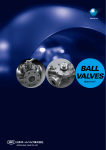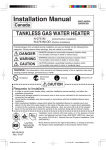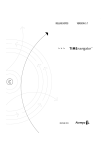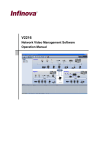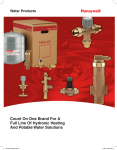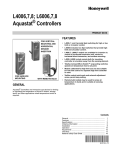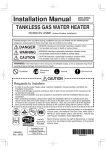Download Honeywell MV100 User's Manual
Transcript
MV100 Electric Controllers T100, T200 Thermostatic Controllers and V2000 Radiator Valves PRODUCT DATA THERMOSTATIC CONTROLS T100 APPLICATION The MV100, T100, T200 Controllers, when paired with V2000 Radiator Valves, provide automatic temperature control by modulating the flow of steam or hot water through freestanding radiators, convectors, and other heating units. They provide comfort and energy savings at affordable prices. T100M FEATURES T100F T100B • Continually monitors and adjusts room temperature for consistent comfort and relief from underheating and overheating. T100C • T100,T200 Controllers include sensor, setpoint dial and valve actuator; components can be integral or connected by capillary tubing. T200 • T100,T200 Controllers require no electrical connections. • T100A,F,M models have range limiting features to limit adjustment or lock at a fixed setting (can require limit pin accessory). MV100 • EPDM valve seat disk assures tight shutoff on steam and hot water systems. VALVE BODIES • Nickel-plated bronze cast valve body. • Cartridge containing all working parts inserts into valve body for ease of service. • Cartridges are replaceable while valves remain in service and under pressurE (WITH accessory service tool MT100C). V2043H • Valves remain normally open with no control mounted. • Valves can be used with T100, T200 Thermostatic or MV100 Electric Controllers. Contents V2040A V2040D V2040E V200LD Application ........................................................................ 1 Features ........................................................................... 1 Specifications ................................................................... 2 Ordering Information ........................................................ 2 Installation ........................................................................ 5 Wiring (MV100 only) ......................................................... 9 Operation .......................................................................... 9 Settings and Adjustments ................................................. 9 Single-Pipe Steam Applications ....................................... 10 Troubleshooting ................................................................ 12 Pressurized Valve Cartridge Replacement ....................... 13 62-3048—2 MV100 ELECTRIC CONTROLLERS T100, T200 THERMOSTATIC CONTROLLERS AND V2000 RADIATOR VALVES SPECIFICATIONS MV100 Electric Controller Materials: Body: Industrial grade plastic with low thermal conductivity. Fastening Ring: Plated brass. Internal Parts: Brass thermostat capsule, other metals. Thermal Element: T100A,M: Wax. T200,T100B,C,F: Liquid Ethyl Acetate (non-toxic, flammable). Dimensions: See Fig. 1. Materials: Body: Industrial grade plastics with low thermal conductivity. Fastening Ring: Plated brass. Internal Parts: Brass thermostat capsule, other metals. Thermal element: Wax-filled brass capsule. Temperature Ratings: Range: 43°F to 79°F (6°C to 26°C). Maximum: 125¼F (52¼C). Electrical Ratings: Control Type: Spst switch. Controller: Voltage: 24 Vac, 60 Hz, or 24 Vdc. Power Consumption: 0.125A, 3W. End Switch: Low-voltage (24 Vac, 5A), two-position, spst, normally open switch (closes when controller powered). V2000 Valves Models: See Table 2. Dimensions: See Fig. 2 and 3. Configuration (with Controller Mounted): Normally closed (valve remains closed without power). Materials: Body: Bronze. V2040A (1/2 in.): Brass. Union: Brass. Stem Seal: Double EPDM seal. Cartridge: Brass and stainless steel with EPDM seat disk. NOTE: Normally open model available in Canada. Opening Time (at 78°F): Maximum: 5 minutes from cold to fully open. Ambient Temperature Rating: Maximum: 122°F (50°C). NOTE: Apply 25 ft.-lb. (30 N•m) torque when installing the valve cartridge. T100,T200 Thermostatic Controllers Maximum Temperature Rating: 266°F (130°C). Models: See Table 1. Maximum Pressure Ratings: System: Water: 145 psi (10 bar). Steam: 15 psi (103 kPa). Differential: With MV100 Controller: 36 psi (248 kPa). With T100 or T200 Controller: 14.5 psi (1 bar). For Low Noise: 2.9 psi (20 kPa). Dimensions: See Fig. 1. Power: Self-powered, no electrical connections. Components: Sensor, setpoint dial and valve actuator. Sizes: V2024H: 1/8 in. V200LD: 1/2 in., 3/4 in. V2040D,E,A: 1/2 in., 3/4 in., and 1 in. ORDERING INFORMATION When purchasing replacement and modernization products from your TRADELINE® wholesaler or distributor, refer to the TRADELINE® Catalog or price sheets for complete ordering number. If you have additional questions, need further information, or would like to comment on our products or services, please write or phone: 1. Your local Honeywell Automation and Control Products Sales Office (check white pages of your phone directory). 2. Honeywell Customer Care 1885 Douglas Drive North Minneapolis, Minnesota 55422-4386 In Canada—Honeywell Limited/Honeywell Limitée, 35 Dynamic Drive, Scarborough, Ontario M1V 4Z9. International Sales and Service Offices in all principal cities of the world. Manufacturing in Australia, Canada, Finland, France, Germany, Japan, Mexico, Netherlands, Spain, Taiwan, United Kingdom, U.S.A. 62-3048—2 2 MV100 ELECTRIC CONTROLLERS T100, T200 THERMOSTATIC CONTROLLERS AND V2000 RADIATOR VALVES T100A TOP T100M TOP 2 (50) 2 (50) T100C 1 (25) 2-1/8 (54) CAPILLARY TUBE LENGTH 4-1/2 FT (1.4 m) 2-1/8 (54) 1-13/16 (46) 2-5/32 (55) 3 (77) 3-5/16 (84) MAX. 2-31/32 (75) CAPILLARY TUBE LENGTH 4-1/2 FT (1.4 m) M12927 M12929 M12925A T100B 2-1/8 (54) T100F CAPILLARY TUBE LENGTH 6-1/2 FT (2m) OR 16 FT. (5m) 2-1/8 (54) 2 (50) CAPILLARY TUBE LENGTH 6-1/2 FT (2 m) 1-13/16 (46) 2-5/32 (55) 3-5/16 (84) MAX. 2-31/32 (75) M12928 M12926 T200A TOP MV100 2 (51) H n n ax km x u xx ra x xx B xxx xx x 1-9/16 (40) 2-7/8 (74) 13/16 (20) M3187A 3 (76) MAX M12945 Fig. 1. MV100, T100 and T200 dimensions in in. (mm). 3 62-3048—2 MV100 ELECTRIC CONTROLLERS T100, T200 THERMOSTATIC CONTROLLERS AND V2000 RADIATOR VALVES Table 1. T100,T200 Models. Model Control Range Mounting Capillary Description T100A 43°F to 79°F (6°C to 26°C) Direct None T100B 48°F to 79°F (9°C to 26°C) Remote One 6-1/2 ft (2 m) Sensor and setpoint dial combined and remote from valve or 16 ft (5 m) actuator. Remote Two 4-1/2 ft (1.4 m) Direct with remote sensor. One 6-1/2 ft (2 m) Sensor is remote from combination setpoint dial and valve actuator. T100M Directa None Components are in one tamper-resistant unit. T200A Directa None White body with chrome-plated end. T100C T100F a 43°F to 79°F (6°C to 26°C) a Components are in one unit. Components mount remotely from each other. Mount the unit horizontally on the valve body for accurate temperature regulation. Table 2. V2000 Models. Connection Model Body Pattern V2040D Straight V2040E Angle Inlet Outlet Application NPT Threaded Union Nut with Use where manual valves were not originally installed. NPT Threaded Typically used with remote temperature sensing controllers. or Sweat Typically used with direct-mount controllers (T100A,M; T200A) V2040A Horizontal Angle V200LD Straight Sweat Sweat Use with copper tubing installations. V2042H/ V2043H One-Pipe 18 in. NPT 1/8 in NPT for SA123A Vent Use in single-pipe steam applications. V2040D (Straight Body) V2040E (Angle Body) B MAX. B MAX. C A M12930B V2040A (Horizontal Angle Body) A M12931B V200LD (Straight Body) C B MAX. B MAX. A M12932B M12933B Fig. 2. V2000 dimensions. NOTE: Refer to Table 3 for detailed valve dimensions for each valve size. 62-3048—2 4 A MV100 ELECTRIC CONTROLLERS T100, T200 THERMOSTATIC CONTROLLERS AND V2000 RADIATOR VALVES Table 3. Valve Dimensions. Valve Size in in. V2040D 1/2 A in in. (mm) 3-3/4 (95) B Maxa in in. (mm) C in in. (mm) 4-1/16 (104) — 3/4 4-3/16 (106) 4-1/16 (104) — 1 4-1/2 (114) 4-1/2 (114) — 1 (26) V2040E 1/2 2-5/16 (58) 3-3/16 (98) 3/4 2-5/8 (66) 3-13/16 (98) 1-1/8 (29) 1 2-15/16 (74) 4-5/16 (110) 1-5/16 (34) 2-1/8 (54) 4-1/2 (115) 3/4 2-1/2 (64) 5-3/16 (132) 1-3/16 (31) 1 2-15/16 (74) 5-3/16 (132) 1-7/16 (37) A 1-1/8 (28) C 5 V2040A 1/2 B MAX. 3/4 V2042H 3/8 2-5/8 (66) 6 0 V200LD 1/2 4-1/16 (104) — M17016 2-15/16 (74) 4-1/16 (104) — Fig. 3. V2042H (Body)/V2043H (Body with Airstream Vent) Dimensions. 1-11/16 (43) 3-13/16 (98) 1-3/16 (31) aB Max dimension is with T100A control installed, except for the V2042H, for which it is without the steam/air vent installed. NOTE: Refer to Table 3 for detailed valve dimensions for each valve size. INSTALLATION Connections: Inlets Available: Internally threaded. Sweat (1/2 in. and 3/4 in. only). Outlets Available: Union nut with threaded tailpiece. Sweat (1/2 in. and 3/4 in. only). Union nut with sweat tailpiece (1/2 in. and 3/4 in. only). When Installing this Product... 1. 2. Capacity: Cv (gpm at 1 psi drop across fully-open valve): 1/2 in.: 2.0. 3/4 in.: 2.2. 1 in.: 2.3. Btuh (Btu/hr at 7 psi drop across fully-open valve): 1/2 in.: 59,100. 3/4 in.: 63,800. 1 in.: 70,500. 3. 4. Read these instructions carefully. Failure to follow them could damage the product or cause a hazardous condition. Check the ratings given in the instructions and on the product to make sure the product is suitable for your application. Installer must be a trained, experienced service technician. After installation is complete, check out product operation as provided in these instructions. CAUTION Accessories: 203225 Replacement Bulb Guard for T100F. 272844 Locking Cap and Limit Pins for T100M. 272873 MT100C Cartridge Tool Driver Upgrade Kit. A104F Limit Pins for T100A,F. VS1200SL01 Replacement Valve Cartridge. G111B Bulb Guard to protect T100C sensor when wall-mounted. VA8200A001 Valve Cartridge Replacement Tool for system under pressure (V2000). Q110D Inlet Strainer Inserts for NPT V100 (models available for 1/2 in. and 3/4 in. valves). SA123A Steam/Air Vent for V2042HSL10 One-pipe Steam Valve. Equipment Damage Hazard. Excessive force can distort and damage valve. Do not overtighten the union nut. CAUTION Equipment Damage Hazard. Driving an unmounted MV100 can damage the actuator beyond repair. Mount the MV100 before applying power to the actuator. CAUTION Sweat Valve Damage Hazard. Soldering the valve with the cartridge or controller attached can damage the device. Prior to attaching valve to piping, remove controller and cartridge from potential exposure to heat. IMPORTANT When installing the valve body, ensure that the arrow (cast into the body) points in the direction of the flow. 5 62-3048—2 MV100 ELECTRIC CONTROLLERS T100, T200 THERMOSTATIC CONTROLLERS AND V2000 RADIATOR VALVES Pre-setting and Balancing Flow Through Valve Body. One complete revolution of the black pre-setting ring equals a pre-setting of 10 (Fig. 7). Close valve with straight blade screwdriver by turning black pre-setting ring clockwise. M22690 Fig. 7. One complete revolution equals a pre-setting of 10. Table 4. CV Values. Presetting M22687 3/8 in. Fig. 4. Closing valve. When closed, the position of the screwdriver slot equals presetting zero. Mark the position of the slot with a felt tip pen. 1 2 0.29 0.58 3 0.87 4 5 6 7 Open 1.16 1.45 1.68 1.80 2.00 1/2 in. 2.15 3/4 in., 1 in. 2.26 NOTE: Pressure drop (psi) = (flow[gpm]/cv)2. Product Selection 1. 2. M22688 Fig. 5. Mark zero position of screwdriver slot. Take required value from Table 4. Turn presetting ring counterclockwise with a straight blade screwdriver to this position. IMPORTANT The T100 and T200 are modulating, not manual shutdown, valve actuators. Do not use them for hand shutoff valves. Chose value has to be congruent with marking. M22689 Fig. 6. Set pre-setting ring to correct value. 62-3048—2 Select the installation diagram (from Fig. 4 through 16) that most accurately represents your equipment and piping configuration. Use Table 4 to select the combination of controller and valve that is most suitable based on: a. Equipment and pipe configuration, see Tables 1 and 2. b. Flow capacity requirement, see Specifications section. 6 MV100 ELECTRIC CONTROLLERS T100, T200 THERMOSTATIC CONTROLLERS AND V2000 RADIATOR VALVES Typical Applications Table 5. Figure References to Typical Applications. Application Figure No. Controller Valve T100A, T100M, T200, MV100 V2040D 9 T100A, T100M, T200, MV100 V2040A 10 T100A, T100M, T200, MV100 V2040E 11 T100A, T100M, T200, MV100 V2042H 12 T100M, MV100 V2040A 13 T100F, MV100 V2040E 14 T100F, MV100 V200LD 15 T100F, MV100 V2040D 16 T100F, MV100 V2042H 17 T100B, MV100 V2040D 18 T100B, MV100 V2040E 19 T100C, MV100 V2040D 20 T100C, MV100 V200LD M12934 Fig. 10. 0 5 4 8 M3236 Fig. 11. One-pipe steam system. M4631 Fig. 8. M12935 Fig. 12. M4632 Fig. 9. M4635 Fig. 13. 7 62-3048—2 MV100 ELECTRIC CONTROLLERS T100, T200 THERMOSTATIC CONTROLLERS AND V2000 RADIATOR VALVES M4640 M3190 Fig. 14. Fig. 18. M4638 M12936A Fig. 15. Fig. 19. SA123A V2042H T100A M12939 Fig. 20. M11752A Location and Mounting Fig. 16. Because these controls are thermostats that have sensors that measure air temperature in the immediate vicinity, it is critical to select an appropriate installation location. These devices are adversely affected by radiant heat, solar heat or airflow obstructions such as curtains or enclosures. Two essential considerations for choosing the correct controller/valve body combination for a particular installation are: — — Adequate dimensional clearances. Proper sensor positioning. IMPORTANT Install built-in sensor type controllers in a horizontal position to prevent air warmed by the hot valve body from influencing the sensor. M12937 Fig. 17. NOTE: The most common misapplication of these valves and controllers is the use of a horizontal-body valve (V2040E) with a direct-mount controller (T100A,M or T200A). See Fig. 17. 62-3048—2 8 MV100 ELECTRIC CONTROLLERS T100, T200 THERMOSTATIC CONTROLLERS AND V2000 RADIATOR VALVES MV100 END SWITCH RED 2 PTC RESISTANCE HEATER TO CIRCULATOR PUMP MULTIZONE PANEL OR BURNER RELAY RED YELLOW 3 T810/T822 1 1 POWER SUPPLY. PROVIDE DISCONNECT MEANS AND OVERLOAD PROTECTION AS REQUIRED. CORRECT INCORRECT L1 (HOT) L2 YELLOW 2 NORMALLY OPEN END SWITCH CLOSES WHEN MV100 IS POWERED. M16272A 3 SUGGESTED HEAT ANTICIPATOR SETTING IS 0.35A. Fig. 21. Horizontal-body V2000 application. M12947A Fig. 22. MV100 internal schematic and wiring connections. Install controllers with external sensors in any position. The sensor can easily be mounted in a position to measure and control the room air temperature. OPERATION NOTE: When temperature of medium exceeds 190°F (88°C), mount the MV100 horizontally. WIRING (MV100 ONLY) The T100 and MV100 Controllers contain temperaturesensitive capsules that expand or contract in reaction to temperature changes. — Wire the MV100 according to Fig. 18. — CAUTION When the capsule expands, pressure from the expanding material closes the valve, preventing flow through the radiation unit. When the capsule contracts, the valve opens and flow resumes through the radiation unit. T100 Equipment Damage Hazard. Can short equipment circuitry. Disconnect all power supplies before installation. The T100 temperature-sensitive capsule expands when the temperature rises above the setpoint. MV100 CAUTION When signalled by the thermostat, an electric element in the MV100 heats the capsule causing it to expand. Equipment Damage Hazard. Connecting improper voltage can damage the device beyond repair. Connect only 24 Vac or 24 Vdc to the MV100. NOTE: For normally open MV100 models, the capsule cools when signalled by the thermostat. SETTINGS AND ADJUSTMENTS When installation is complete, rotate the setpoint dial to the desired setting. NOTE: The setpoint varies with the location of the sensor. A floor level sensor controls at a setpoint different from the wall level sensor. Normally, correction of an overheating or underheating condition requires only small changes. See Table 5 for dial markings and corresponding temperature settings. After changing the setting, allow the valve at least 30 minutes to stabilize. 9 62-3048—2 MV100 ELECTRIC CONTROLLERS T100, T200 THERMOSTATIC CONTROLLERS AND V2000 RADIATOR VALVES Table 6. T100 and T200 Settings and Corresponding Temperatures in °F (°C). 2 3 4 5 6 T100A,F 32 (0) 0 43 (6) 46 (8) 54 (12) 61 (16) 68 (20) 73 (23) 79 (26) T100B,C — 55 (13) 61 (16) 64 (18) 68 (20) 72 (22) 75 (24) 79 (26)a T100M — 43 (6) 61 (16) 64 (18) 68 (20) 72 (22) 75 (24)a 79 (26)a T200 — 43 (6) 52 (11) 57 (14) 63 (17) 68 (20) 73 (23) 79 (26) a * 1 Setting not marked on dial. NOTE: Torque cartridge to 25 ft-lb. Setpoint Locking or Limiting (T100A,F,M only) SINGLE-PIPE STEAM APPLICATIONS A single temperature or range-limiting lock is available for the T100A,F,M. See Accessories in the Specifications section. Refer to the T100A,F,M Installation Instructions for procedural details. Many older buildings original heating systems were single-pipe steam. The advantage of single-pipe steam systems is lower initial cost, resulting from the use of less piping and elimination of radiator steam traps. Cartridge Replacement CAUTION With the appropriate tools, the V2000 cartridge can be replaced while under pressure. Boiler Flooding Hazard. Loss of system control and boiler damage can result. For a one-pipe steam system radiator, install valve only at the vent location. WARNING Severe Scalding Hazard. Contact with hot liquid can lead to severe injury or cause death. For a pressurized valve, only open with Valve Cartridge Replacement Tool. CAUTION Refer to Fig. 12 for installing the one-pipe steam radiator adapter assembly. Hot Surface Hazard. Contact with hot valve body can cause severe burning. Service cartridge only when valve body is cool. Single-Pipe Steam Systems CAUTION T100/V2043H (with vent) operation to provide temperature control for a formerly uncontrolled single-pipe steam system follows: Hazardous Splashing Fluids. Can injure, burn, or blind. Wear safety glasses or goggles. 1. 2. 3. Under Pressure Replacing the V100 Cartridge with the system under pressure requires the Valve Cartridge Replacement Tool (see Accessories in the Specifications section). See Pressurized Valve Cartridge Replacement section for details. 6. Replacing the cartridge without the Valve Cartridge Replacement Tool requires one of the following: 7. • Isolation of valve from system pressure. • System shutdown and drain to valve level. Once the valve is not pressurized: 2. 8. Using a 3/4 in. (19 mm) hex (6- or 12-point) socket wrench, remove and discard the cartridge. Clean the inside of valve and cartridge sealing surfaces. Install a new cartridge. 62-3048—2 4. 5. Not Under Pressure 1. IMPORTANT Ensure vacuum breakers are installed on the steam system risers. If vacuum breakers (that open to the atmosphere at zero psig) are not installed, the system can develop a negative pressure and pull steam back into the radiators on resumption of steam. 10 9. The boiler is off (zero steam pressure); radiators are filled with air; the vent is open. The T100 calls for heat, opening the valve. At the command of an external controller (such as a representative zone thermostat, or a timer controlled by outside temperature) the boiler cycles on and begins delivering steam to the system. Steam enters the radiator, forcing air through the open V2042H and out through the vent. Once the air is exhausted, the steam heats the thermostatic element of the vent, causing it to close. The steam cools forming condensation. Condensation flows out of the radiator making room for more steam to enter. The T100 is eventually satisfied (temperature equals the setpoint) and it closes the V2042H. The air in the system (introduced by the vacuum breakers) begins to fill the radiator. The air in the radiator prevents steam from coming in and the radiator cools. The boiler cycles off by command of components external to the T100/V2042H and the steam pressure returns to zero. MV100 ELECTRIC CONTROLLERS T100, T200 THERMOSTATIC CONTROLLERS AND V2000 RADIATOR VALVES NOTE: — — While the T100 is satisfied, the V2042H is closed and the radiator remains airlocked. Thus, no steam can enter the radiator. The airlocked condition remains until the T100 calls for heat, at which point the system operates as described in steps 1 through 6. An improperly cycled boiler causes either excessive heating or lack of heat, depending on the system time constant. Bringing the Steam Pressure to Zero psig To assure the proper operation of any single-pipe steam system, ensure that the steam pressure is brought to zero at some time during the off-cycle. One suggested procedure follows: 1. Determine if steam is required using one of two methods: a. A thermostat in a representative zone controls the valve or cycles the boiler. b. A timing device cycles the boiler for varying lengths of time in response to outdoor temperature. IMPORTANT When cycling the boiler from a space thermostat in a zone, do not apply a radiator valve to that radiator. 2. Turn off the steam and allow system pressure to drop to zero. Do this using one of two methods: a. Turn the boiler off and allow the total steam pressure in the system to drop to zero. NOTE: Install the valve on the boiler side of the condensation takeoff to ensure that the condensation can return to the boiler. 3. Verify that the steam pressure has returned to zero. Verification Verification is necessary to prove that the pressure has returned to zero. Simply turning off the boiler or shutting off the steam supply does not ensure zero steam pressure. The simplest way to check for zero pressure follows: 1. 2. 3. Install a strap-on Aquastat® Controller, such as the Honeywell L6006C Aquastat® Controller, on the condensation return line (see Fig. 19). Set the Aquastat® Controller at about 150°F (66°C). With the return line at or below this temperature, the water is all condensation, and the pressure is functionally zero. Wire the Aquastat Controller into the interrupting circuit to ensure that steam flow cannot resume until the condensation line is below the setpoint. The 150°F (66¡C) setpoint serves as a nominal starting point and can require adjustment for individual steam systems. MASTER ZONE THERMOSTAT 1 L1 (HOT) L2 L6006C 24 Vac LOW VOLTAGE RELAY PRIMARY CONTROL IMPORTANT Before applying controls to turn a boiler on and off, check the manufacturer recommendations. 1 b. In installations where turning the boiler off at the end of each cycle is undesirable, install a control valve (such as a Honeywell V5011 Valve) on the boiler discharge line. 11 POWER SUPPLY. PROVIDE DISCONNECT MEANS AND OVERLOAD PROTECTION AS REQUIRED. M7536A Fig. 23. Holding circuit for use with L6006 when verifying zero psig steam pressure. 62-3048—2 MV100 ELECTRIC CONTROLLERS T100, T200 THERMOSTATIC CONTROLLERS AND V2000 RADIATOR VALVES TROUBLESHOOTING Refer to Table 6 for troubleshooting details. Table 7. T100/V2000 Troubleshooting. Symptom Possible Cause Solution Not all sections of the radiator are heating. Many radiators are oversized and System is operating properly. not all sections heat to maintain the desired temperature. Underheating Sensor in the wrong location. Change the sensor location or change the control type. See Installation Instructions. T100A,M Controller mounted in a Mount the T100A,M horizontally, or switch controller to a T100F. vertical position above the hot pipe. Excess capillary tubing coiled above or too close to the heat source. Coil excess capillary tubing below or away from the heat source. Flow through the valve is in the wrong direction. Check the arrow on the valve body. It should be in the direction of the flow. Change the valve direction or flow direction. Inadequate system temperature or Check boiler operating and limiting controls, circulating pump, and pressure. isolating valves. Overheating Defective steam traps. Repair or replace the traps. Airlock in the hot water system. Fully open the valve to allow air to pass. Install vents. Scale or debris blocks flow. Flush the system. Do not use oil-based additives. Clean strainer insert in steam applications. Heating cabinet dampers are closed. Open or remove the dampers. Single-pipe: Blocked vent. Remove and inspect vent. Replace if necessary. Sensor in the wrong location. Change sensor location or change control type. Control not properly installed. Check for bosses and grooves, reset actuator on valve and tighten knurled ring to valve body. Capillary tube broken, kinked or bent sharply. Replace control. Dirt or scale under the seat prevents tight shutoff. Remove the control from the valve body, allowing valve to open fully and flush away scale and debris. Reinstall control. Turn fully clockwise. If the valve does not close fully, remove the control and cartridge (see Cartridge Replacement section). Always use a strainer insert in steam applications. Flow through the valve is in the wrong direction, damaging the valve seat. Check the arrow on the valve body. It should correspond to the flow direction. Change the valve direction or flow direction. Remove valve cartridge and inspect seat disk for damage. Defective steam traps. Repair or replace traps. Excessive differential pressure forces the valve open (hot water systems). Install differential pressure regulator (D146A) to maintain less than 15 psi (103 kPa) differential between the supply and return pipes. Single-pipe: Insufficient air in system. Check boiler cycling and system vacuum breakers. Repair or replace breakers as necessary. Chattering or knocking. Flow through the valve in the wrong direction. 62-3048—2 Check the arrow on the valve body. It should correspond to the flow direction. Change the valve direction or flow direction. Vacuum in the system. Steam—check traps and vents. Hot water—check expansion tank operation and location. Excessive differential pressure. Install differential pressure regulator (D146A) to maintain less than 15 psi (103 kPa) differential between the supply and return pipes. Bent piping. Ensure adequate space for piping. 12 MV100 ELECTRIC CONTROLLERS T100, T200 THERMOSTATIC CONTROLLERS AND V2000 RADIATOR VALVES PRESSURIZED VALVE CARTRIDGE REPLACEMENT B The VA8200A001 Valve Cartridge Changing Tool enables the user to remove, and clean or replace the valve cartridge while the valve remains pressurized. Boiler shutdown is not required. D A WARNING Severe Scalding Hazard. Contact with hot liquid can lead to severe injury or cause death. Exercise extreme caution when working with hot liquid. C M16273 Fig. 25. Attaching VA8200A001 to valve. CAUTION Hazardous Splashing Fluids. Can injure, burn, or blind. Wear eye protection to prevent injury. B To remove the cartridge, perform the following: 1. Remove controller and loosen valve cartridge slightly using a 19mm socket wrench (A,B). See Fig. 20. 2. Tighten VA8200A Cartridge Changer to valve body (A,B), close drain cock (C), and turn tool handle ccw to unscrew cartridge (D). See Fig. 21. 3. Pull handle out to clear VA8200A ball valve (A), close ball valve (B), and open drain cock to remove excess water and steam from chamber (C). See Fig. 22. 4. Unscrew end cap (A) and remove cartridge from chamber (B). See Fig. 23. 5. Clean or replace cartridge. A C M16275 Fig. 26. Disconnecting valve cartridge and draining chamber. B A A M16274 B Fig. 24. Loosening valve cartridge. M16276 Fig. 27. Removing valve cartridge. To reinstall cartridge into the valve, use the same process and figures. Perform steps in reverse order. All figure arrows are backwards (except Fig. 20, arrow A). Proceed as follows: 1. 2. 3. 4. 13 Replace cartridge into chamber (B) and screw end cap onto VA8200A (A). See Fig. 23. Close drain cock (C), open ball valve (B), and push handle in (A). See Fig. 22. Turn tool handle cw to screw in cartridge (D), open drain cock to drain chamber of remaining water and steam (C), and loosen VA8200A Cartridge Changer from valve body (B,A). See Fig. 21. Tighten valve cartridge using a 19mm socket wrench (A,B) and replace controller. See Fig. 20. 62-3048—2 62-3048—2 14 15 62-3048—2 Automation and Control Solutions Honeywell International Inc. Honeywell Limited-Honeywell Limitée 1985 Douglas Drive North 35 Dynamic Drive Golden Valley, MN 55422 Scarborough, Ontario M1V 4Z9 customer.honeywell.com ® U.S. Registered Trademark © 2006 Honeywell International Inc. 62-3048—2 G.R. Rev. 02-06
















